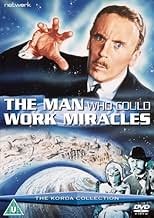Aggiungi una trama nella tua linguaAn ordinary man suddenly finds that anything he says comes true. Or at least, almost anything.An ordinary man suddenly finds that anything he says comes true. Or at least, almost anything.An ordinary man suddenly finds that anything he says comes true. Or at least, almost anything.






























